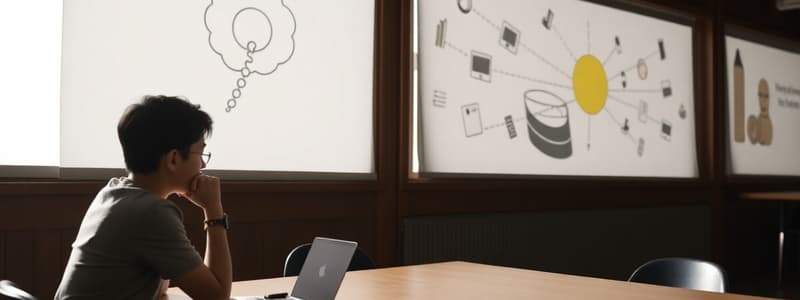Podcast
Questions and Answers
Which of the following is NOT an example of postformal thinking?
Which of the following is NOT an example of postformal thinking?
- A young adult chooses a career that doesn't align with their parents' expectations.
- A young adult marries someone from a different racial or ethnic background than their own.
- A young adult decides to attend a college that has a good reputation for the specific major they're interested in.
- A young adult chooses to live in a different city than their parents did.
- A young adult moves back home after graduating college to save money before starting their career. (correct)
What are the reasons why individuals may pursue higher education?
What are the reasons why individuals may pursue higher education?
Acquiring specific skills and knowledge, as well as personal and intellectual growth.
The text suggests that the benefits of college are primarily due to a student's family background.
The text suggests that the benefits of college are primarily due to a student's family background.
False (B)
Postformal thinking emphasizes the importance of solely objective reasoning.
Postformal thinking emphasizes the importance of solely objective reasoning.
What is the significance of diversity within colleges, according to the text?
What is the significance of diversity within colleges, according to the text?
The text supports the idea that college has become a less effective environment for promoting advanced cognition compared to decades ago.
The text supports the idea that college has become a less effective environment for promoting advanced cognition compared to decades ago.
The text presents a purely positive outlook on the role of college in modern society.
The text presents a purely positive outlook on the role of college in modern society.
Flashcards
Flashcards
Flashcards
Cards used for studying and memorizing information. Each card typically contains a term on one side and its definition on the other.
Term
Term
The word or phrase being studied or learned.
Definition
Definition
The explanation or meaning of the term.
Hint
Hint
Signup and view all the flashcards
Memory Tip
Memory Tip
Signup and view all the flashcards
Testing Effect
Testing Effect
Signup and view all the flashcards
Active Retrieval
Active Retrieval
Signup and view all the flashcards
One Concept Per Card
One Concept Per Card
Signup and view all the flashcards
Progressive Build-up
Progressive Build-up
Signup and view all the flashcards
Core Concepts
Core Concepts
Signup and view all the flashcards
Study Notes
Development of Adult Thinking
- Adult thinking is more practical and flexible than adolescent thought, combining intuition and analysis.
- Postformal thought, a fifth stage beyond Piaget's formal operational stage, integrates emotion and pragmatics.
- Postformal thinkers are flexible and consider all aspects of situations. This stage is more complex than formal scientific problem-solving.
Postformal Thought Characteristics
- Postformal thinking is practical and creative.
- Adult brains activate more brain regions in response to events compared to adolescents.
- Integrative thinking combines logic and experience.
- Adult thinkers are capable of flexibility, accepting imperfections in themselves, families, and society.
Mate Selection in Emerging Adulthood
- Emerging adults show signs of integrative thinking in career choices, location, lifestyle, and relationships.
- They may not follow childhood patterns in relationships.
- Emotional and rational considerations are combined in mate selection.
- Intermarriage rates are higher in adult relationships, indicating a focus on compatibility rather than traditional norms based on ethnicity or religion.
Combining Facts and Emotions
- Postformal thought moves beyond dual processing (objective and subjective thought).
- Postformal thinkers combine objective logic with subjective experiences and emotions.
- Example: Laura's postformal thought about alcohol involves factual knowledge together with emotional experiences (flashbacks).
Adult Cognition and Education
- Emotional sensitivity is needed for navigating adult life's complexities.
- College education can enhance cognitive development but some aspects of current college structures may not encourage these developmental areas.
- Factors influencing student cognition: declining levels of critical thinking, increased stress levels, and the use of cognitive enhancers.
- Concerns about the prevalence of certain study habits, like relying on drugs to enhance cognitive functions, are rising.
- Political and/or ethnic diversity is valuable for expanding perspectives. College environments that foster a balance between diverse opinions, encourage discussion, and support critical thinking, are best.
Factors for Increased Stress and Misplaced Focus in Students
- Emotional distress is increasing in students despite varied circumstances.
- Some students may not prioritize study strategies and personal development that lead to true intellectual and cognitive advancement.
- College experiences are less focused on critical thinking, compared to previous generations, this may be a concern in the advancement of a student's cognitive processes due to reduced emphasis placed on the curriculum.
Economic and Social Factors Shaping Adult Decisions
- Differences in educational background of parents impact a student's life in several ways, and in particularly, the choices they make about education.
- Less socioeconomically privileged students may choose college for economic benefits, and may be less focused on developing critical thinking skills than more privileged students.
- Factors like family background can further impact decisions related to lifestyle , study, or relationship choices.
Studying That Suits You
Use AI to generate personalized quizzes and flashcards to suit your learning preferences.




